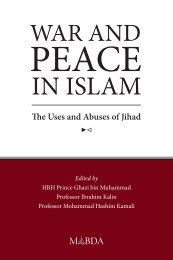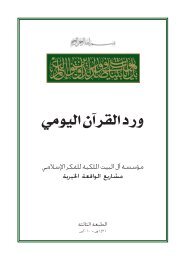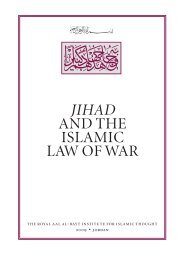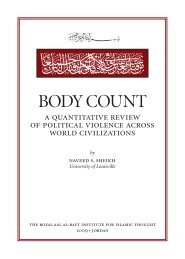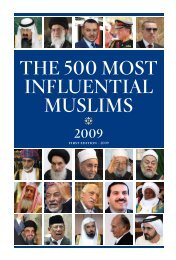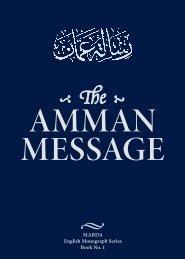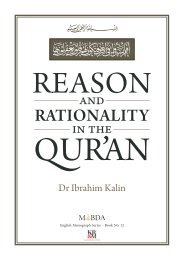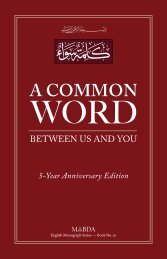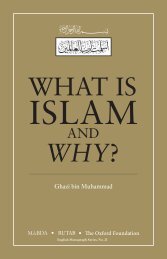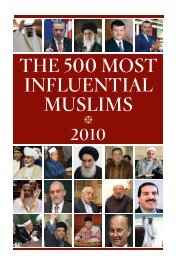Al-W¥^idÏ's Asb¥b al-Nuz‰l - The Royal Islamic Strategic Studies ...
Al-W¥^idÏ's Asb¥b al-Nuz‰l - The Royal Islamic Strategic Studies ...
Al-W¥^idÏ's Asb¥b al-Nuz‰l - The Royal Islamic Strategic Studies ...
You also want an ePaper? Increase the reach of your titles
YUMPU automatically turns print PDFs into web optimized ePapers that Google loves.
Asbab <strong>al</strong>-Nuzul<br />
left open and even accepted as legitimate. It was accepted as legitimate because the prophetic Companions<br />
followed, in their understanding of the Qur’an, a clear and well-defined methodology which they<br />
inherited from the Prophet as well as from their long acquaintance with the Qur’anic text whose revelation<br />
in inst<strong>al</strong>ments they person<strong>al</strong>ly witnessed.<br />
<strong>The</strong> necessity and extreme importance of codifying the knowledge and methodologic<strong>al</strong> tools<br />
required for a proper understanding and interpretation of the Qur’an, and <strong>al</strong>so of some other disciplines,<br />
was greatly felt when the prophetic Companions dispersed in different parts of the Muslim world. Other<br />
soci<strong>al</strong>, politic<strong>al</strong> and theologic<strong>al</strong> factors <strong>al</strong>so played a major role in channelling the efforts of Muslim scholarship<br />
to codify the knowledge inherited from the Prophet and his Companions. Less than three decades<br />
after the death of the Prophet, different ethnic groups came under the fold of Islam. Muslims <strong>al</strong>so came<br />
into contact with the pre-<strong>Islamic</strong> religions of Byzantium and Persia. Politic<strong>al</strong> dissent and schisms among<br />
Muslims impacted on how some Muslims approached their religion at the intellectu<strong>al</strong>, theologic<strong>al</strong> and<br />
practic<strong>al</strong> levels. And matters were further complicated by the emergence of the Kharijites, the Shi‘ites<br />
and the Mu‘tazilites within the House of Islam. Against this backdrop, the sciences of the Qur’an (‘Ulum<br />
<strong>al</strong>-Qur’an) emerged as a separate discipline, just as <strong>Islamic</strong> law, theology, Hadith and other speci<strong>al</strong>ised<br />
branches of knowledge did emerge as independent disciplines.<br />
A quick glance at the contents of any major classic<strong>al</strong> work on the sciences of the Qur’an 5 will<br />
reve<strong>al</strong> that Muslim scholars have left nothing to chance and did exert a great de<strong>al</strong> of effort to cover every<br />
possible aspect that the commentator of the Qur’an might need in his or her objective appreciation of the<br />
Qur’an; aspects without which a comprehensive understanding and interpretation of the Book of Islam<br />
is extremely difficult, and even impossible. <strong>The</strong>se sciences de<strong>al</strong>, among others, with the knowledge of the<br />
first and the last passages of the Qur’an to be reve<strong>al</strong>ed; the portions of the Qur’an reve<strong>al</strong>ed in Mecca and<br />
those reve<strong>al</strong>ed in Medina; the passages of the Qur’an reve<strong>al</strong>ed while the Prophet was travelling; those<br />
passages which were reve<strong>al</strong>ed at night and those which were reve<strong>al</strong>ed during the day; the sections of the<br />
Qur’an which were reve<strong>al</strong>ed in summer and those which were reve<strong>al</strong>ed in winter; how the Qur’an was<br />
sent down; the different names of the Qur’an and Surahs; the collection and ordering of the Qur’an; the<br />
names of the prophetic Companions who memorised the Qur’an and the names of those who transmitted<br />
it; the different types of recitation (<strong>al</strong>-Qira’at), those which are accepted and those which are not;<br />
the proper pronunciation and recitation of the Qur’an; the different Arabic di<strong>al</strong>ects used in the Qur’an;<br />
the foreign vocabulary of the Qur’an; homonyms and key-words which the commentator of the Qur’an<br />
needs to know; the clear and obscure verses (<strong>al</strong>-Ayat <strong>al</strong>-Muhkamat/<strong>al</strong>-Ayat <strong>al</strong>-Mutashabihat); the passages<br />
of the Qur’an which are of gener<strong>al</strong> applicability and those which are of particular applicability; the<br />
abrogating and abrogated passages of the Qur’an (<strong>al</strong>-Nasikh/<strong>al</strong>-Mansukh); the passages which require<br />
details and explanation in order to be properly understood and those passages which do not require further<br />
elaboration; the passages whose purport is applied without restriction and those which are applied<br />
with restriction; the inimitability of the Qur’an, etc. It is not our intention here to give a detailed list of<br />
<strong>al</strong>l the topics covered in works on the sciences of the Qur’an. If we have listed quite a few of these topics<br />
above, it is only in order to show the seriousness with which Muslim scholars have approached their<br />
Holy Book and their thorough and comprehensive way of exploring it. 6<br />
One of these sciences of the Qur’an is the Asbab <strong>al</strong>-Nuzul, i.e. the occasions, reasons or causes<br />
of revelation. <strong>The</strong> Qur’an, as is well known, was reve<strong>al</strong>ed in inst<strong>al</strong>ments over a period of nearly twenty<br />
three years. Muslim scholars agree that the revelations of the Qur’an can be divided into two broad<br />
types. One type includes passages of the Qur’an which were reve<strong>al</strong>ed in response to specific events, incidents<br />
or questions put forward to the Prophet, <strong>Al</strong>lah bless him and give him peace. <strong>The</strong> second type<br />
5<br />
See, for example, the contents of J<strong>al</strong><strong>al</strong> <strong>al</strong>-Din <strong>al</strong>-Suyuti’s <strong>al</strong>-Itqan fi ‘Ulum <strong>al</strong>-Qur’an (Dar <strong>al</strong>-Nadwah <strong>al</strong>-Jadidah, Beirut, n.d.) which<br />
is considered one of the best books on the sciences of the Qur’an; and for an English translation of these contents, see: <strong>Al</strong>-Tabari,<br />
<strong>The</strong> Commentary on the Qur’an, volume 1, (tr. J. Cooper), Oxford University Press, 1987, pp. xxxvii-xxxix.<br />
6<br />
<strong>The</strong> importance and necessity of the different sciences of the Qur’an cannot be emphasised enough. However, from the point of<br />
view of person<strong>al</strong> spiritu<strong>al</strong> discipline <strong>al</strong>one, a Muslim does not need to know <strong>al</strong>l the detailed knowledge that these sciences provide.<br />
This is because from this particular point of view, <strong>al</strong>l that matters is how to regain the sense of eternity — which is the aim of any<br />
genuine spiritu<strong>al</strong> discipline — and partake in the re<strong>al</strong>m of the ‘etern<strong>al</strong> now’ which is the re<strong>al</strong>m of the Qur’an. <strong>Al</strong>l that a Muslim<br />
is required to do, in this regard, is to approach the Word of God with awe and utter indigence and make the Qur’an his point of<br />
focus on the Divine.<br />
x



